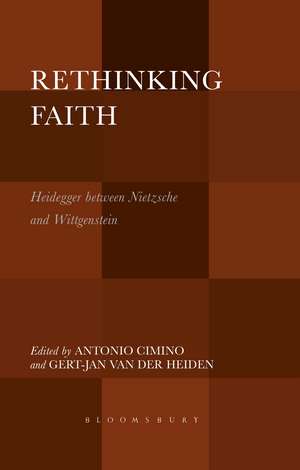Rethinking Faith: Heidegger between Nietzsche and Wittgenstein
Editat de Dr. Antonio Cimino, Professor Gert-Jan van der Heidenen Limba Engleză Paperback – 30 mai 2018
| Toate formatele și edițiile | Preț | Express |
|---|---|---|
| Paperback (1) | 236.45 lei 6-8 săpt. | |
| Bloomsbury Publishing – 30 mai 2018 | 236.45 lei 6-8 săpt. | |
| Hardback (1) | 713.72 lei 6-8 săpt. | |
| Bloomsbury Publishing – 2 noi 2016 | 713.72 lei 6-8 săpt. |
Preț: 236.45 lei
Preț vechi: 305.08 lei
-22% Nou
Puncte Express: 355
Preț estimativ în valută:
45.25€ • 46.75$ • 37.66£
45.25€ • 46.75$ • 37.66£
Carte tipărită la comandă
Livrare economică 26 martie-09 aprilie
Preluare comenzi: 021 569.72.76
Specificații
ISBN-13: 9781501342127
ISBN-10: 1501342126
Pagini: 224
Dimensiuni: 152 x 229 x 16 mm
Greutate: 0.3 kg
Ediția:NIPPOD
Editura: Bloomsbury Publishing
Colecția Bloomsbury Academic
Locul publicării:New York, United States
ISBN-10: 1501342126
Pagini: 224
Dimensiuni: 152 x 229 x 16 mm
Greutate: 0.3 kg
Ediția:NIPPOD
Editura: Bloomsbury Publishing
Colecția Bloomsbury Academic
Locul publicării:New York, United States
Caracteristici
Interdiscplinary: will appeal not only to researchers working in the field of continental philosophy, but also to a diverse range of audiences interested in theology, history of contemporary philosophy, history of German culture, philosophical hermeneutics, and philosophy of religion
Notă biografică
Antonio Cimino is a postdoctoral researcher at Radboud University in Nijmegen, The Netherlands. His books include Ontologia, storia, temporalità: Heidegger, Platone e l'essenza della filosofia (2005) and Phänomenologie und Vollzug: Heideggers performative Philosophie des faktischen Lebens (2013). Gert-Jan van der Heiden is Professor of Metaphysics at Radboud University in Nijmegen, the Netherlands. His books include The Truth (and Untruth) of Language (2010), De stem van de doden (2012) and Ontology after Ontotheology (2014).
Cuprins
AcknowledgementsContributorsIntroductionPart 1: The Phenomenon of Religion1. Understanding Religious Faith: A Hermeneutical ApproachBen Vedder (Radboud University in Nijmegen, The Netherlands)2. Is Ontology the Last Form of Idolatry? A Dialogue between Heidegger and MarionClaudio Tarditi (University of Turin, Italy)3. A Religious End of Metaphysics? Heidegger, Meillassoux, and the Question of FideismJussi Backman (University of Jyväskylä, Finland)Part 2: Faith and Reason4. "How we, too, are still pious.": The Status of Truth and the Irreducibility of Faith in the Work of NietzscheCarlotta Santini (Princeton University, USA)5. Dionysius, Apollo, and other Göttliche: Denial and Excess of Meaning in Nietzsche, Heidegger and WittgensteinTobias Keiling (Albert-Ludwigs-Universität Freiburg, Germany)6. "A way of living, or a way of assessing life": Wittgenstein on Faith, Reason, and PhilosophyChantal Bax (Radboud University in Nijmegen, The Netherlands)7. A Question of Faith: Heidegger's Destructed Concept of Faith as the Origin of Questioning in PhilosophyVincent Blok (Wageningen University, The Netherlands)Part 3: Pauline Resonances8. Heidegger on Religious Faith: The Development of Heidegger's Thinking about Faith between 1920 and 1928Ezra Delahaye (Radboud University in Nijmegen, The Netherlands)9. The Experience of Contingency and the Attitude to Life: Nietzsche and Heidegger on PaulGert-Jan van der Heiden (Radboud University in Nijmegen, The Netherlands)10. Paul as a Challenge for Contemporary Philosophers: Nietzsche, Heidegger, and AgambenAntonio Cimino (Radboud University in Nijmegen, The Netherlands)Index
Recenzii
Rethinking Faith is an excellent collection of essays. It examines persuasively the complex nature of Heidegger's view of faith and religion. It also situates his thought in its wider context and shows its implications for contemporary philosophy of religion. It is highly recommended for anyone with an interest in Heidegger and the phenomenon of religious faith.
It has taken us some time to concentrate on the fact that Nietzsche, Heidegger and Wittgenstein do not simply banish religious faith from philosophy, but broaden the definition of faith until the specifically religious affirmation appears as only one instance of it. Perhaps it is not yet clear what this step will have meant either for philosophy or for religion, but there is no longer any question of walking it back. The essays collected here are at once excellent studies of some of the crucial texts and authors, and helpful guides to reflection on the questions that they raise. Students and scholars of philosophy, theology and religious studies will read them with interest and gratitude.
A fruit of an international research project of extraordinary scope and interdisciplinary significance, this collective philosophical intervention into the shifting function and actuality of faith is a compelling achievement. The book demands of us of no less than a radical reorientation of our philosophical and religious archives, even as it compels us to face profound contemporary questions about the nature of contingency and the substance of our political solidarities. In Rethinking Faith we have a philosophical tour de force which floods new light onto those traumas of faith or trust which we cannot escape.
It has taken us some time to concentrate on the fact that Nietzsche, Heidegger and Wittgenstein do not simply banish religious faith from philosophy, but broaden the definition of faith until the specifically religious affirmation appears as only one instance of it. Perhaps it is not yet clear what this step will have meant either for philosophy or for religion, but there is no longer any question of walking it back. The essays collected here are at once excellent studies of some of the crucial texts and authors, and helpful guides to reflection on the questions that they raise. Students and scholars of philosophy, theology and religious studies will read them with interest and gratitude.
A fruit of an international research project of extraordinary scope and interdisciplinary significance, this collective philosophical intervention into the shifting function and actuality of faith is a compelling achievement. The book demands of us of no less than a radical reorientation of our philosophical and religious archives, even as it compels us to face profound contemporary questions about the nature of contingency and the substance of our political solidarities. In Rethinking Faith we have a philosophical tour de force which floods new light onto those traumas of faith or trust which we cannot escape.
